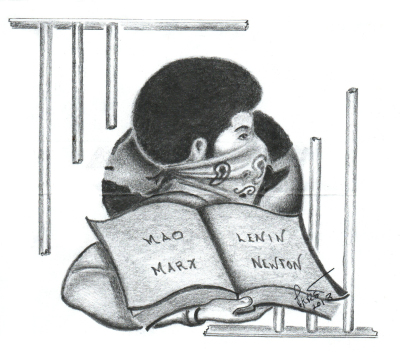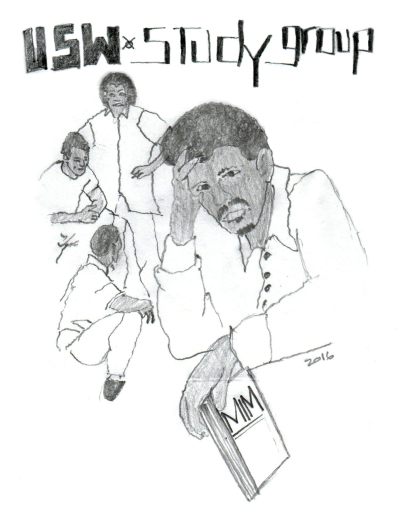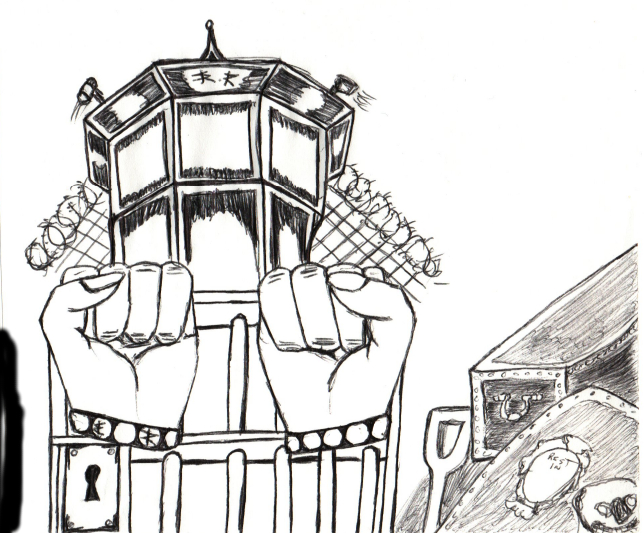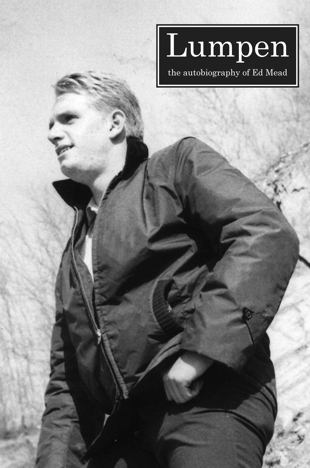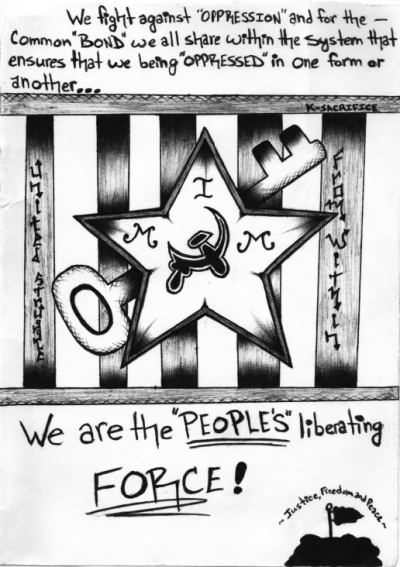Prison organizations today have the tendency to bang on other orgs more
than they do on the pigs, Corrections Officers (COs) and the system. Raw
fear is so deep in us and we’ve placed the oppressors on such a
pedestal, thinking the pigs are “godly,” invincible and “in-the-right,”
that we’ve become stuck. Shaking in our boots or peeking out the blinds
shuddering. The pigs want us believing we are degenerates or mentally
ill rejects and to trust boldly that the pigs are only trying to help
us. One comrade voiced concern over seeing ruthlessness so deep between
lumpen orgs in his gulag that captives cheer suicides and mental
breakdowns in fellow captives but want to know how “snouty sir’s”
vacation went. It’s a sad situation.
“Earning stripes” and “putting it down for the cause” is telling when it
is fellow captives being lifeflighted and body-bagged as the man with
the keys giggles. Putting it down for whom? MIM(Prisons) and USW don’t
promote violence. But there are lesser and higher levels of
incorrectness when the man pushes us in the corner in the use of
self-defense. Viciousness and brutality against our own is unforgivable.
Period.
Watered-down versions of the various struggles that came before are
served up steaming before our hungry, bloodshot eyes. Organizing our
people to realize our destiny takes theory and analysis of past and
present conditions. Marxism-Leninism-Maoism is the meat we must partake
of. Throw that watered down soup kitchen fare into snouty’s face. The
actual methods on how to organize and take control of our destiny is
what’s for dinner, comrades. Educating, agitating, theorizing, study
groups, unity and books challenge bullshit and backward ideas. Knowledge
of history and our present reality is what we lack. We must recoup from
the losses we’ve experienced after all these years. Muscle has memory,
believe that! We are only doomed to that failure if we remain asleep.
Will we?
Independent nationhood isn’t in the forefront of most lumpen minds when
Seinfield sitcoms and chick-o-sticks occupy our perception. Progressives
of all stripes must rip the amerikkkan flags out of our faces and walk
over the motherfucker. Parasites In Gangsters clothing, CIA. Sheep
infiltrating LOs mainstream gangster rap or pig induced crap? Occupy
wall street or spitting on Third World’s feet? Stand in our fork in the
road. We are at the historical juncture where the hustling game [dope,
pimpin etc.] as our only “come up” must be shot to shit as the game
plan. The dope game’s insanity. There is a more practical revolutionary
way to control our destinies and obtain independence. Getting ourselves
out the imperialist crosshairs must be our goal. Not protecting street
corners and crack, meth or herb market shares. Just look at the Mexican
cartels doing it big time as their people in the base areas remain
hungry, shoeless and without basic necessities. The sad aspect is we
leave our families in the same boat. We must overcome this.
We must remember, though, that the oppressor will always let one or two
big shots come up. Some cartels’ base areas in Mexico do gain better
living conditions to pacify unrest and garner support from the people.
Is drug dealing, guns and stickups too entrenched in the lumpen’s
economic life that survival, even survival at such low levels, would be
impossible without them? This is the ideological crossroads we stand at.
What is preventing oppressed nation people from coming together and
bucking this system? If the drug trade doesn’t act as a sleeping gas, in
that we benefit from it, but as a poison which hurts us, then why do we
continue in it? Drug culture and popular culture seem to contribute to
this deviation. The use and sale of drugs is addictive. But so is the
culture that comes with it. The street/dope world envelops an individual
in non-political thinking. Like a cancer, few survive. Some do manage to
feed their children and make ends meet slanging but only so long. And at
a high price (prison, death, addicted sons and daughters, brain damage,
disease etc.).
The media mind washes us into believing the oppressor pigs are “all
mighty” and McDonald’s workers are slow and slimy. This puts us in the
trap of spending our whole lives trying to prove to each other we aren’t
slow and slimy. But why don’t we prove this to the oppressor?
Consumerism, amerikkkanism and patriotism stand toe to toe with mass
revolutionary politics. And we ain’t getting nowhere until the referee
drags out the bleeding corpse of “grams, hundreds and eight balls” lying
at our feet. Drug culture down. Revolutionary culture up. Drug culture
is used as a sort of net to catch rebels before they truly do turn
revolutionary. And by the time the drugs spit us out on the cement floor
of a solitary cell, collapsed vein and hollow brain, psychotropic
culture steps in with a great big smile. Know your enemy.
Most people in the U.$. have an idealistic philosophical view of
socioeconomic and political structure so that they support reformist
political movements before they do revolutionary movements. Spending
time voting for the richest man or writing your governor are almost
laughable when one discerns 98% of amerikkka is enemy. Class
consciousness in the labor aristocracy and bourgeoisie is high while in
the lumpen it is low. Privileges, false-consciousness and “the
amerikkkan dream” got us hook, line and sinker chasing the carrot. The
pigs, the imperialists, keep us out of legal employment with the
opportunity of upward mobility being impossible. So we chase the
illusion of the amerikkkan dream in the drug game. To chase ideals
taught in elementary and high school right into our caskets. It is this
juvenile ass scenario preventing our peoples from unity and throwing off
this system like a bad habit.
When the drug trade ceases, and excuses for policing and imprisonment
have no grounds to stand on, the government would have to backpedal the
drug war into their garage. Most of us don’t realize that the more
violence we contribute to, in and out of prison, the more excuses for
SHUs and SWAT team type scenarios pop up. Can you imagine the power in
directing the crack fiend’s intelligence, cunning and commitment into
politics?! Imperialism fears such scenarios. This is why they keep the
drug trade on and popping. Prison guards, street cops, prison
administrators, food-telephone-parole-commisary, etc., services would be
jobless if we put down the pipe, the drug war’s an illusion and
smokescreen hiding the wizard of oz behind its fancy tapestry.
Mexican cartels make billions off the drug trade. This money they funnel
into amerikkkan banks. The $20 dope fiend gets one to fifteen yeas as
the 2 billion dollar dealers get free checking. The sad part in all this
is the money in these banks, made from Latino cartels, goes to oppose
revolutions in Nicaragua, Paraguay, Iraq, Afghanistan, etc. The more
Third World countries Amerikkka has under its thumb the more goods
oppressor nation labor aristocrats can siphon. Third World countries
like Mexico act as prime markets for amerikkkan products and prime hot
spots for factories that employ oppressed wimmin and children on 60
times less money than amerikkkans make.
These Mexican cartels are not the principal enemy. But even though they
are fighting against the oppressed nations’ interest worldwide, they are
still oppressed nation national bourgeois and minority compradors. We
take Mao’s example in China when he united with Chaing Kai Shek, an
oppressor, to defeat Japanese imperialism, the bigger oppressor. Mao’s
tactic worked. We must employ such means, when necessary, if we want to
succeed in bringing imperialism to its knees. One divides into two and
some of these cartels will side with revolution and some with
imperialism. To label all as enemy would in effect shoot ourselves in
the feet. Some of the money cartels make goes to the revolution, here
and abroad, that’s almost assured. So the drug trade is internationalist
in some of its practice. We must avoid the trap of big nation chauvinism
and see that 80% of the world is Third World.
Most lumpen orgs will not transform into revolutionary orgs as long as
they can benefit materially from working in cahoots with the
imperialists, i.e. pushing dope and other hustles. Most youth these days
haven’t even heard of their set’s infancy. Lumpen orgs were originally
created to fight oppression in the hood. But the pigs infiltrated these
orgs and turned them into oppressive groups. Like a vampire. What better
way for a vampire oppressor to sleep easy than making sure everyone from
sea to shining sea are themselves vampire oppressors!? Just lock up
behind razor wire those whose necks they can get at and it’s sweet
dreams for dracula.
Today’s youth’s mission is realizing protracted struggle is necessary in
smashing oppression. We must understand that a concerted effort, that
may take many years, is ahead of us. But it’s also winnable. China and
Russia succeeded in defeating backwards systems. We can too. Most
comrades get discouraged after so many years of struggling. To struggle
isn’t easy but it’s capable of giving extreme satisfaction when one
looks back at the progression one accomplishes over the years. WE have
been misled and under-educated by design. All in an effort at halting
our progression and the resolution of the imperialist contradiction. Our
Humanity has been stolen. We have no empathy for war or starvation. How
sick is that?
Back in the day Jim Crow laws made people rise up against oppression.
Then it fizzled out until the Vietnam War made people revolt. Nowadays
mass incarceration, the new Jim Crow, and Afghanistan are our hot spots
of agitation. But the sad part is most lumpen embrace prison and war.
Most of us believe we belong in chains and the Middle East is full of
“terrorists.” It’s a mind wash. It is amerikkka who is terrorist. And
the Middle East are our people. We know deep down that shit’s not right.
One comrade in the study group spoke about the suicide rate, and even
his very own suicidal tendencies before politics, as being exponential.
USW wants to begin to show how change is possible. We will attempt to
provide the roadmap but it is on you to start your cars. Let’s discover
our humanity and start questioning things around us. War and starvation
are a preventable. Let us challenge each other to grow and create a
better way for ourselves and the future.
Mainstream hip hop and drugs are killing us. Oppressed nation lumpen eat
that shit up like rat poison. “The amerikan dream” a.k.a. “rat poison.”
If the amerikkkan dream is to starve and create war so I can have an
x-box and cheap gasoline it’s not worth it. Not to USW. You? Dirtying
the names of groups like the Black Panther Party, MIM(Prisons) and USW
is a tactic used to revise history and throw a wrench in the revolution.
People seem to either embrace us or spit on us, and from what we’ve
experienced there’s seldom middle ground. But it says more about the
spitter than anything else. We must learn to uphold the standards we
promote and avoid straddling the fence or deviating from issues.
Practice is principal. Is our work focused on anti-community or
pro-community work? The people will recognize which pole we are on,
that’s assured. We must rest easy in the knowledge that the pigs’ truth
ain’t ours. There is no truth in common between the oppressor and the
oppressed. Because the aims, efforts and goals we push are seen as a
threat to their wealth and leisure time privileges. USW looks up to the
Panther legacy for these reasons above, and many others. We invite
thorough study of the rich revolutionary heritage of our forebearers
with the black berets. Power to all oppressed people.

